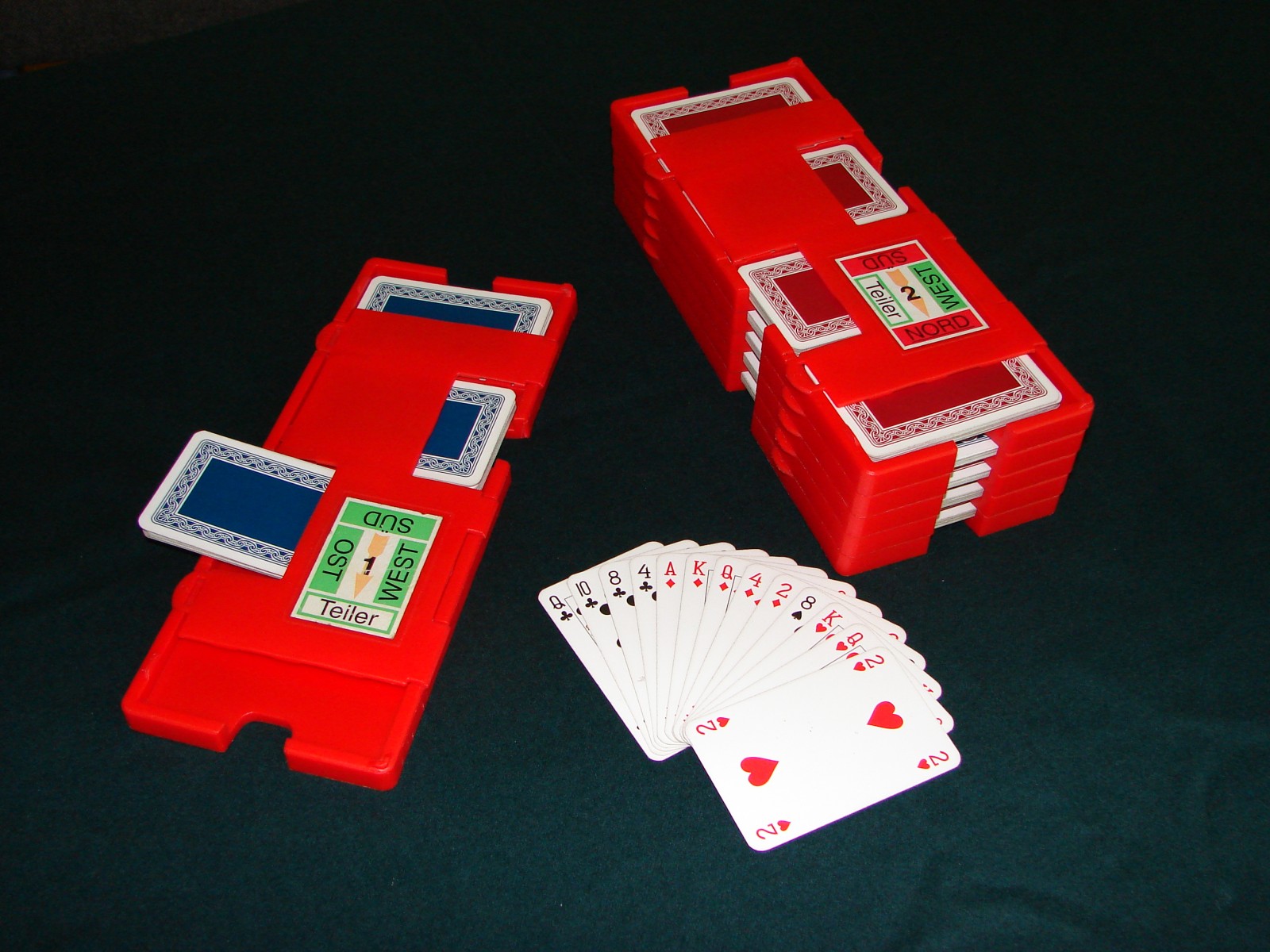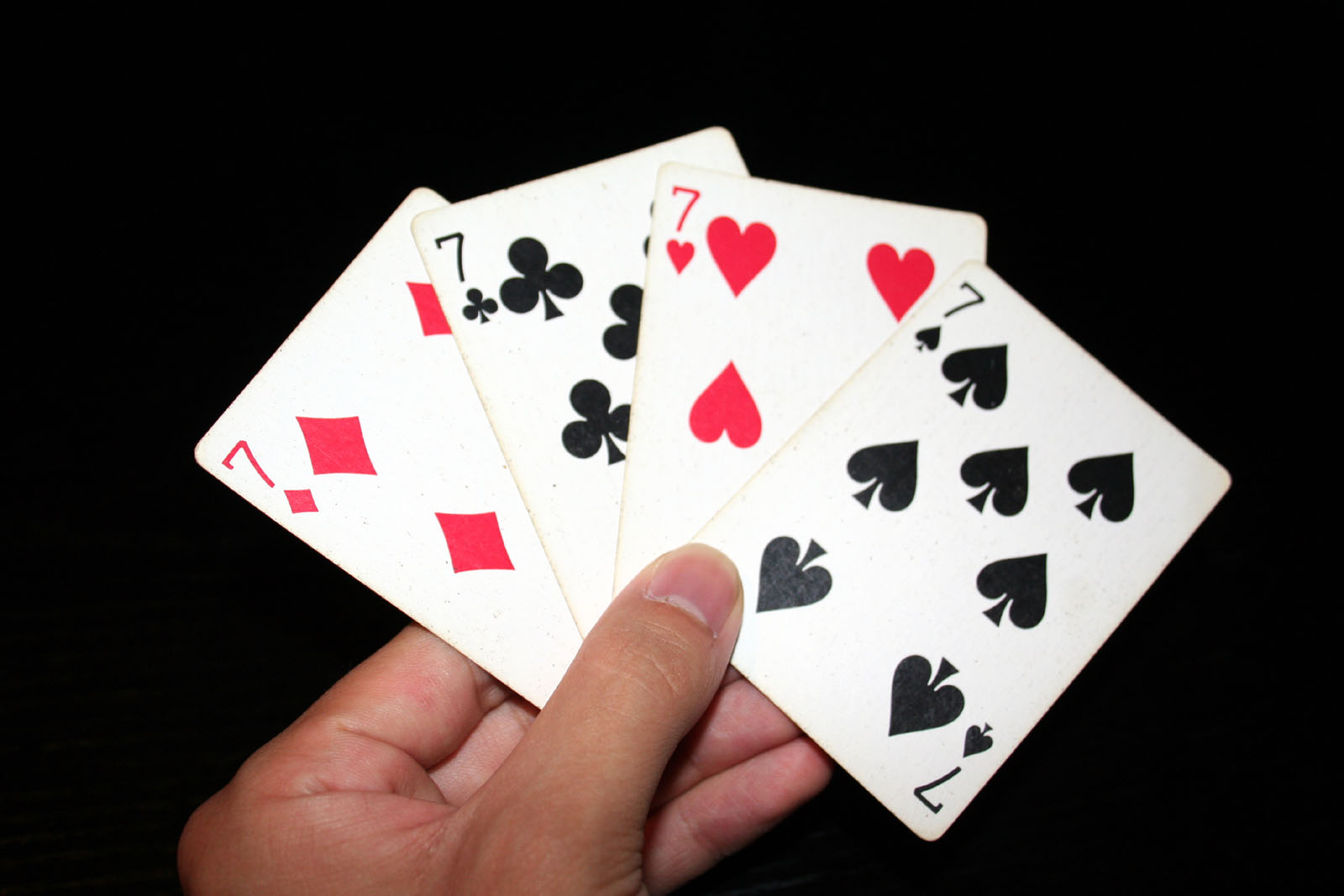|
Thunee
Thunee, after the Tamil word for water, is a popular trick-taking card game of the Jack-Nine family that originated in Durban, South Africa. It is believed that the game was developed by the first indentured Indian labourers. There are variations of the game found in India and Mauritius. The game is mostly confined to the former Indian townships, where it is very popular as a family game and in fund-raising tournaments, but to some extent it has spread to other South Africans and to Indians in other countries. The game Euchre is very closely related. The first thunee world championship was held in Pietermaritzburg in 2003. The game is part of the Jack Nine card games family, which includes twenty-eight, and the much older card games of the Jass family which are German in origin. This game is generally enjoyed at any occasion. Thunee is enjoyed by both young and older generation amongst the Indian community. Thunee is also enjoyed during porridge prayers and goat prayers among ... [...More Info...] [...Related Items...] OR: [Wikipedia] [Google] [Baidu] |
Durban
Durban ( ) ( zu, eThekwini, from meaning 'the port' also called zu, eZibubulungwini for the mountain range that terminates in the area), nicknamed ''Durbs'',Ishani ChettyCity nicknames in SA and across the worldArticle on ''news24.com'' from 25 October 2017. Retrieved 2021-03-05.The names and the naming of Durban Website ''natalia.org.za'' (pdf). Retrieved 2021-03-05. is the third most populous city in South Africa after Johannesburg and Cape Town and the largest city in |
Twenty-eight (card Game)
Twenty-eight is an Indian trick-taking card game for four players, in which the Jack and the nine are the highest cards in every suit, followed by ace and ten. It thought to be descended from the game 304, along with similar Indian games known as "29", "40" and "56". Overview Twenty-eight originated in India. The game is believed to be related to the European family of Jass card games, which originated in the Netherlands. These games are believed to have been brought to India by Indian South Africans who were also influenced by the Afrikaaner game of Klaverjas. Twenty-eight is a very popular game in the state of Bihar. Some believe that the game originated in the Lakhisarai district of Bihar. The game is also very popular in South India, particularly in the state of Kerala where it is known as ''Irupathiyettu'' ( ml, ഇരുപത്തിയെട്ട്) or ''Thuruppu'' ( ml, തുറുപ് Trump). Twenty-nine is a variation of the game that is popular in North India ... [...More Info...] [...Related Items...] OR: [Wikipedia] [Google] [Baidu] |
Trick-taking
A trick-taking game is a card or tile-based game in which play of a '' hand'' centers on a series of finite rounds or units of play, called ''tricks'', which are each evaluated to determine a winner or ''taker'' of that trick. The object of such games then may be closely tied to the number of tricks taken, as in plain-trick games such as contract bridge, whist, and spades, or to the value of the cards contained in taken tricks, as in point-trick games such as pinochle, the tarot family, briscola, and most evasion games like hearts. Trick-and-draw games are trick-taking games in which the players can fill up their hands after each trick. In most variants, players are free to play any card into a trick in the first phase of the game, but must ''follow suit'' as soon as the stock is depleted. Trick-avoidance games like reversis or polignac are those in which the aim is to avoid taking some or all tricks. The domino game Texas 42 is an example of a trick-taking game that is no ... [...More Info...] [...Related Items...] OR: [Wikipedia] [Google] [Baidu] |
Jack–Nine Card Games
The Jack–Nine card games, also known as the Jass group, form a family of trick-taking games in which the jack (''jass'') and nine (''manille'') of the trump suit are the highest-ranking trump (card game), trumps, and the tens and aces of all suits are the next most valuable cards... Games in this family are typically played by 2 or 4 players with 32 French-suited cards. Popular European games in this family include four-handed Belote, Klaverjas and Jass but also a widespread two-hander known under various names including Bela and Klaberjass. With the exception of the South Asian variants ''Twenty-nine'', ''Twenty-eight'' and ''Fifty-six'', trick-play in these games follows special rules that encourage trumping and overtrumping. The Jack–Nine group is a subfamily of the Marriage group of card games which in turn is a sub-family of the Ace-Ten games, Ace-Ten group that is very popular in most of Europe, but almost absent in the British Isles and Scandinavia. Overview Variants of ... [...More Info...] [...Related Items...] OR: [Wikipedia] [Google] [Baidu] |
French Deck Card Games
French (french: français(e), link=no) may refer to: * Something of, from, or related to France ** French language, which originated in France, and its various dialects and accents ** French people, a nation and ethnic group identified with France ** French cuisine, cooking traditions and practices Fortnite French places Arts and media * The French (band), a British rock band * "French" (episode), a live-action episode of ''The Super Mario Bros. Super Show!'' * ''Française'' (film), 2008 * French Stewart (born 1964), American actor Other uses * French (surname), a surname (including a list of people with the name) * French (tunic), a particular type of military jacket or tunic used in the Russian Empire and Soviet Union * French's, an American brand of mustard condiment * French catheter scale, a unit of measurement of diameter * French Defence, a chess opening * French kiss, a type of kiss involving the tongue See also * France (other) * Franch, a surname * Fre ... [...More Info...] [...Related Items...] OR: [Wikipedia] [Google] [Baidu] |
Tarneeb
Tarneeb ( ar, طرنيب, ṭarnīb, lit= trump), also spelled tarnibe and tarnib, and called hakam ( ) in the Persian Gulf region, is a plain trick-taking card game played in various Middle Eastern countries, most notably in the countries of the Levant, and Tanzania. The game may be considered a variation of Whist, or a version of Spades. History Historically the game can be traced back to the Levant, however the game seems to have truly flourished only from the early 18th century. Overview The aim is to win a set of continuous hands. There are four players in partnerships of two teams. A standard 52 card deck is used, each suit ranking in the usual way from Ace (high) down to two (low). The game is played anti-clockwise. Teams stay together for all the games of a set. In a tournament, at the end of a set, the losing team is replaced for the next set.Hugh Miles, ''Playing Cards in Cairo'', pg. 1, Abacus Software (2008) Partners sit opposite each other, often at a table in su ... [...More Info...] [...Related Items...] OR: [Wikipedia] [Google] [Baidu] |
Euchre
Euchre or eucre () is a trick-taking game, trick-taking card game commonly played in Australia, Canada, New Zealand, Great Britain, and the United States. It is played with a deck of 24, 28, or 32 standard playing cards. Normally there are four players, two on each team, although there are euchre game variations, variations for two to nine players. Euchre emerged in the United States in the early 19th century and, while there several theories for its origin, the most likely is that it derives from an old Alsatian game called Juckerspiel, Jucker. Euchre was subsequently responsible for introducing the Joker (playing card), joker into the modern deck of cards, first appearing in Euchre packs in the 1850s. Origins and popularity ''Eucre'' is briefly mentioned as early as 1810 by Piomingo, a Chickasaw chief, being played in a gaming house alongside All Fours (card game), all fours, loo (card game), loo, cribbage and whist. In 1829, ''uker'' was being played with ''bowers'' on a s ... [...More Info...] [...Related Items...] OR: [Wikipedia] [Google] [Baidu] |
Cut (cards)
In card games, to cut the cards (also "cut the deck" or "cut the pack") is to split the deck into two packets by lifting one packet from the top and placing it face down beside the remainder; before placing the lower packet on top of it. This is typically done after the cards have already been shuffled, and the procedure is used just prior to the cards being dealt to the players. The aim of this is to reduce the possibility of cheating, for example, by knowing the bottom card. Cutting the cards is also a common way of determining the seating order at a card table, the partnerships or the first dealer. Purpose The practice of cutting is primarily a method of reducing the likelihood of someone cheating by manipulating the order of cards to gain advantage. Even if the dealer (or the shuffler, if he is not the dealer) does not plan on cheating, cutting will prevent suspicions, thus many rules require it. Some players also consider the cut to be lucky. Parlett says the purpose of c ... [...More Info...] [...Related Items...] OR: [Wikipedia] [Google] [Baidu] |
Suit (cards)
In playing cards, a suit is one of the categories into which the cards of a deck are divided. Most often, each card bears one of several pips (symbols) showing to which suit it belongs; the suit may alternatively or additionally be indicated by the color printed on the card. The rank for each card is determined by the number of pips on it, except on face cards. Ranking indicates which cards within a suit are better, higher or more valuable than others, whereas there is no order between the suits unless defined in the rules of a specific card game. In a single deck, there is exactly one card of any given rank in any given suit. A deck may include special cards that belong to no suit, often called jokers. History Modern Western playing cards are generally divided into two or three general suit-systems. The older Latin suits are subdivided into the Italian and Spanish suit-systems. The younger Germanic suits are subdivided into the German and Swiss suit-systems. The French sui ... [...More Info...] [...Related Items...] OR: [Wikipedia] [Google] [Baidu] |
Jass
:Jass ''was also an early name for Jazz music. For other uses, see JASS.'' Jass ()David Parlett ''The Oxford guide to card games'', pg. 292-293, David Parlett (1990) is a family of trick taking, Ace-Ten card games and, in its key forms, a distinctive branch of the Marriage family. It is popular in its native Switzerland as well as the rest of the Alemannic German-speaking area of Europe, Italian South Tyrol and in a few places in Wisconsin and Ohio, USA. The most common variant of Jass is Schieber (in Vorarlberg also known as ''Krüzjass''), which is played by two teams of two players each. It is often considered Switzerland's national card game, and is so popular there that the Swiss have come to apply the name Jass to trick-taking card games in general. It is estimated that there are over 70 variants of Jass. The game is so widespread in Switzerland that it is regularly featured on radio and television, for example, radio programmes by SRF1 and the weekly television pro ... [...More Info...] [...Related Items...] OR: [Wikipedia] [Google] [Baidu] |





